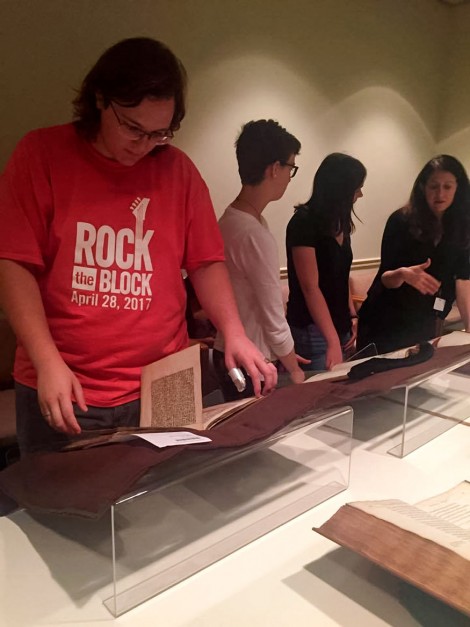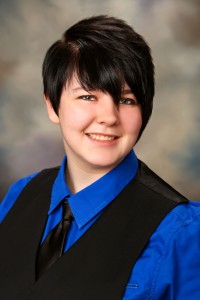
Saving Medieval Manuscripts
Ohio Wesleyan Students Help Digitize Renaissance-Era Texts

Name: Capri Pappas ’20
Major: Medieval Studies (Medieval History)
Hometown: LaGrange, Illinois
Name: Christopher Shanley ’18
Major: Medieval Studies
Minors: History and Religion
Hometown: Grady, Arkansas
Experience
Andrew W. Mellon Foundation Grant-funded internships at Northwestern University’s Early Print Lab
Pappas and Shanley were awarded Mellon Foundation Grants to support summer experiences at the Early Print Lab, where they learned about the curation of Early Modern printed books and worked collaboratively on the curation of digitized texts from the Renaissance.
Lessons Learned
Pappas: “For my final project for the ‘Early Print Lab 2017,’ I worked alongside three other students to align texts from Early English Books Online (EEBO) and the Internet Archive (IA) for the Boston Public Library Special Collections.
“We were responsible for making sure the images of each page on EEBO corresponded to the correct page number on the IA. This is to ensure that future workers can have clearer, higher-quality images of the same pages to transcribe into TEI (Text Encoding Initiative) code. This was for my final project, and I did a lot of other image aligning during the lab.
“I also did other types of work, such as creating TEI coding for some texts, fixing errors made in already-completed TEI coding, and tweaking the ‘Shakespeare His Contemporaries’ website.
“By digitizing these texts, they will become readily available to anyone who wishes to use them, and thus spread more knowledge and interest to not only academia, but the general public as well.
“I feel that everything we did for the Early Print lab ultimately contributes to this sharing process. From transcription to fixing black-dot errors, to image aligning, ESTC (English Short Title Catalogue) matching and library research, we are helping the growth of many curious minds who wish to pursue their interest in early modern texts.
“The work was tedious [but] one day, I will be the one doing the most fascinating research rather than the grunt work, as one may call it. To get to that exciting level, or to eat the main course, someone needs to do the ‘dishwashing,’ as Northwestern Professor Martin Mueller explained early in our workshop. Every step is vital to this process, and I would never have thought so deeply about it until this workshop.
“Through the Early Print lab, I worked so much with old texts that I feel very familiar with them and will feel much more confident in handling them, using them, and reading them in the future. I thank Northwestern for this opportunity, and I will always apply what I’ve learned this summer to my studies of medieval history and beyond.”
Shanley: “Out of the summer as a whole, I learned a great deal about early printing, the development of Modern English, digitizing of archival materials, and XML (Extensible Markup Language – a textual encoding language used in the humanities). These skills will be adopted immediately in my own work, as I will be able to improve the accessibility of my work in Ohio Wesleyan’s Rare Books library.
“I will also make suggestions to OWU to list their collections on the English Short Title Catalogue (ESTC), as we do have items on it. The ESTC is an online database containing every edition of every work printed in English or in an English-speaking nation from 1473-1800. …
“My final project for this workshop was physically looking at more than 300 items in Northwestern’s Special Collections that could not be matched with just bibliographical information to items in the ESTC. This final project taught me that despite the interesting nature of many aspects of rare books libraries, there is very dull and repetitive work to be had. As this is a field that I intend to pursue, it was a valuable lesson for me. …
“It was still very exciting and rewarding to complete this project, as I feel that my accomplishments will greatly help people trying to access these works in the future.
“I do feel that I was able to contribute significantly to Northwestern’s libraries. Besides matching so many items to the ESTC, I was able to identify about 40 errors in their records for them to correct. There were even a few items I identified that matched no items in the ESTC exactly.”
Why I Chose OWU
Pappas: “Upon receiving an email about OWU early in my college-searching process, I explored the website and learned about OWU’s medieval studies program. It blew me away, and certainly shone out among all the other history programs I have seen in other liberal arts colleges. No other school had such a specific, well-supported medieval studies program.
“Upon visiting OWU, my heart felt at home. Every part of the campus felt familiar, like I was meant to go there, and I am so incredibly happy with my choice. My first year at OWU was filled with unforgettable memories and already, so many opportunities opened up for me. I am eager to push along and find more opportunities in the future.”
Shanley: “Ohio Wesleyan, if you ask my mother, was always an obvious choice for me. She noted in the very beginning of my college search that OWU professors all had Ph.D.s, a fact she found very impressive when I had a handful of other schools that I was more intent on.
“But I received a generous scholarship from OWU, and was accepted into the Honors Program. After receiving my acceptance packet, I grew more interested in OWU. After visiting here, I noticed how much more modern and accessible their science building was than those of other Ohio Five schools.
“When I started at OWU, I still thought I was going to be a Pre-Med major (I'm still on their email list, but don't tell anyone)! Even though I did not choose the sciences, OWU was definitely the right choice for me. It led to so many fantastic opportunities, and truly helped me discover my passions.”
My Plans After Graduation
Pappas: “I intend to continue on to grad school to get a master’s degree in medieval history. I am not sure where yet. Ultimately, I would love to become a professor of history and stay within the academic world to research this amazing time period and teach others about it.”
Shanley: “After graduating, I plan to attend graduate school for a degree in medieval or manuscript studies. I wish to eventually get a doctorate, and then to work in a rare books library, like I do now part-time at OWU.”
